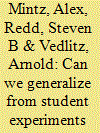|
|
|
Sort Order |
|
|
|
Items / Page
|
|
|
|
|
|
|
| Srl | Item |
| 1 |
ID:
073765


|
|
|
|
|
| Publication |
2006.
|
| Summary/Abstract |
The authors conducted an experiment with a group of military officers and replicated it with a group of students at a public university in the United States. The experimental scenario dealt with a decision problem in the area of counterterrorism. The authors found that while more than one-third of students recommended doing nothing, the overwhelming majority of military officers (more than 90 percent) recommended doing something. Also, military officers exhibited less maximizing and more satisfacing decision making than students. The results show that relying on experiments with students "playing" the role of real-world national security policy makers may bias the results. The two groups are, in fact, very different. Based on student samples, it is possible to accept propositions that would not be found with samples of elite decision makers and reject propositions that may be right. However, it is possible that students can be assigned to experiments where they represent the "public" and not elites.
|
|
|
|
|
|
|
|
|
|
|
|
|
|
|
|
| 2 |
ID:
125708


|
|
|
|
|
| Publication |
2013.
|
| Summary/Abstract |
Nuclear energy was becoming increasingly popular as an alternative to air polluting fossil fuel technologies through the latter half of the 2000s. The tragic events of March 11, 2011 in Fukushima, Japan appear to have instantly killed any momentum the nuclear industry had gained. While unfortunate, many argue that nuclear power is still a safe alternative and that the Fukushima disaster resulted from insufficient safety regulations in Japan, a problem that does not exist in the United States. This project examines U.S. public support for nuclear energy one year after the Fukushima tragedy, seeking to understand the influence of knowledge and risk perceptions on policy support. We evaluate public support for nuclear energy policy from several perspectives using risk and attitudinal measurements that are more specific than often found in the literature to obtain a greater understanding of the connection between policy and risk.
|
|
|
|
|
|
|
|
|
|
|
|
|
|
|
|
| 3 |
ID:
178896


|
|
|
|
|
| Summary/Abstract |
This study focuses on the theoretical links between two important ingredients of individuals’ fundamental political values (i.e. authoritarian ideology and national attachment) and their life satisfaction assessments in an authoritarian context. We employ data from a 2016 national public survey in China to empirically examine how these political values relate to Chinese citizens’ life satisfaction. Our regression analyses demonstrate that Chinese citizens with stronger authoritarian ideology and national attachment are likely to report a higher level of life satisfaction. Our study contributes to the existing literature by highlighting the importance of the connections between political values and citizen life satisfaction. It also advances our understanding of the origins of social and political stability in authoritarian regimes, where citizen life satisfaction usually represents a major source of state legitimacy.
|
|
|
|
|
|
|
|
|
|
|
|
|
|
|
|
| 4 |
ID:
149997


|
|
|
|
|
| Summary/Abstract |
It is important for policy makers to have an accurate understanding of public attitudes toward pressing issues to help inform their decision making. Researchers consistently find that the public’s receipt of and correct processing of scientific information and knowledge are essential for its problem solving. Different levels of understanding of specific energy technologies may produce different risk assessments across technologies within this issue domain. How this differential risk assessment occurs and the role that scientific information may play in it is not yet well known. This project seeks to determine the role that perceived and objective scientific knowledge may play in the public’s risk assessments of different energy technologies. Our findings suggest that scientific knowledge does temper public risk evaluations of different energy technologies, therefore linking more clearly the connection between science knowledge, scientific trust, and issue problem identification.
|
|
|
|
|
|
|
|
|
|
|
|
|
|
|
|
| 5 |
ID:
191539


|
|
|
|
|
| Summary/Abstract |
The study explores terrorism threat perceptions, focusing on the American public’s views of conventional and cyber-terrorism methods. Based on a national survey data, we find that when asked about the likelihood and the extent of threat associated with each type of terror method, citizens make clear and significant distinctions. Furthermore, these distinctions translate to variations in counter-terrorism policy preferences. Our analyses reveal that, considering the low level of knowledge of complex security issues, measuring citizens’ `true attitudes’ requires using survey instruments with lower level of abstraction, which force respondents to ‘stop and think’, and better reflect their associated opinions.
|
|
|
|
|
|
|
|
|
|
|
|
|
|
|
|
|
|
|
|
|